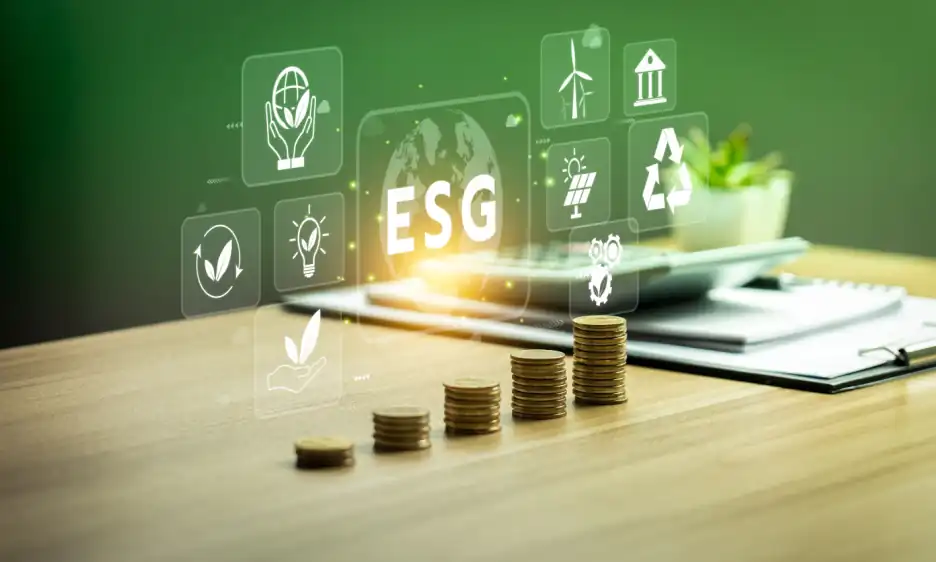The BRSR Framework and its strong impact on Indian Companies
 Share
Share
 Copy Url
Copy Url

The BRSR framework is a vital reporting framework in India for companies who want to show they care about sustainability and doing business the right way. Developed by the Securities Exchange Board of India (SEBI), it helps companies share how they're working on being sustainable and responsible. By using the BRSR framework, companies can achieve certain goals. They can better understand their impact on the environment and society. In doing so, they can then take steps to improve their sustainability performance. This can lead to improved brand reputation, increased investor confidence, and better long-term financial performance.
In this article, we'll take a closer look at the BRSR framework and its benefits. This includes how it can help companies in India show their commitment to sustainability and social responsibility. We'll also explore the framework's structure, the disclosures required, and the principles that guide it. If you're looking to adopt the BRSR framework or want to learn more about sustainability and business responsibility, this article is for you!

What is the BRSR Framework?
The BRSR framework is a set of guidelines for companies in India. It helps them report how they are doing good things for sustainability and being responsible in business. This framework makes sure companies tell people about their work in a clear way. It covers everything from helping the environment to treating people fairly. it isn't just about making money. It's about doing business in a way that's good for everyone. This includes caring for our planet and being honest in how they run their company. It's a big step in making sure companies think about their impact and act responsibly.
How did the BRSR Framework come into existence?
The BRSR framework came to life thanks to the Securities Exchange Board of India, or SEBI. They saw the need for better sustainability reporting in India. So, SEBI introduced the BRSR framework. This big step was based on the National Guidelines on Responsible Business Conduct or NGRBC. These guidelines are rules for companies to be good and careful about how they affect people and the planet. The BRSR framework helps make sure companies in India tell the truth about what they're doing to be sustainable and responsible. It's a way to keep everyone in the loop and encourage companies to do better.
Is BRSR mandatory?
Yes, the Business Responsibility and Sustainability Reporting (BRSR) framework is mandatory for the top 1000 listed companies in India. The BRSR requires businesses to report their performance on environmental, social, and corporate governance (ESG) parameters and demonstrate their commitment to responsible business practices. The BRSR replaced the Business Responsibility Reports (BRR) in 2021. The framework seeks to make connections between a company’s financial performance and ESG performance, making it easier for regulators, investors, and other stakeholders to assess the company’s overall stability, growth, and sustainability. The BRSR also seeks to ensure consistency in reporting boundaries and encourages companies to provide clear, complete, and concise responses.

What are the Benefits of the BRSR Framework?
The Business Responsibility and Sustainability Report (BRSR) framework is a game-changer for companies in India. It's not just a set of rules but a way for businesses to show they're serious about making a positive impact. The benefits of this framework are wide-ranging and crucial for both companies and society. Let's explore these benefits to understand why the BRSR is so important.
Improved Stakeholder Engagement
The BRSR framework helps companies talk better with their stakeholders. This includes customers, employees, and investors. By sharing clear reports on what they're doing for the environment and society, companies build trust and stronger relationships.
Clear Reporting Requirements
The BRSR lays out specific rules for what companies need to report. This makes the reporting process easier to understand and follow. Companies know exactly what information they need to share about their sustainability efforts.
Enhanced Transparency
This framework makes companies more open about their actions. They have to tell the truth about how they impact society and the environment. This honesty helps everyone know that companies are really working to make things better.
Better Decision Making
With the BRSR, companies can see how well they're doing in sustainability. This helps them make smarter decisions about how to be more responsible and sustainable in the future.
Consistency in Reporting
As a sustainability reporting framework, the BRSR ensures that all companies report similarly. This consistency makes it easier for people to compare different companies and see who's making a difference.
The BRSR framework is more than just a reporting tool; it's a pathway toward a more responsible and sustainable future for businesses in India. By improving stakeholder engagement, clarifying reporting requirements, enhancing transparency, aiding in decision-making, and ensuring consistency, the BRSR framework empowers companies to be more accountable and impactful. Its implementation marks a significant step towards a more sustainable and ethically conscious business environment.

Breaking Down the Structure of the BRSR Framework
Getting a handle on the BRSR framework's structure helps us see how it helps companies in responsible reporting. It's more than just ticking boxes. The BRSR is a well-thought-out method that matches up with global standards and puts a spotlight on sustainability. So, let's take a closer look at how the BRSR is set up and how it makes it easier for companies to share what they're doing to be sustainable.
The BRSR framework is built on internationally accepted reporting frameworks. This means it matches global standards for sustainability reporting. It includes several parts. First, it covers general disclosures about the company, like its size and what it does. Then, it dives into how the company follows the National Guidelines on Responsible Business Conduct (NGRBC principles). These principles are all about doing business in a way that's good for people and the planet. The framework asks companies to report on specific areas like environmental impact, social welfare, and governance. This makes sure companies look at all aspects of their impact, not just profits.
In conclusion, The BRSR framework gives Indian companies a solid way to match up with global standards in sustainability and responsible business. It's more than just paperwork. It's about seriously considering and truthfully sharing how businesses impact everything around them. When companies stick to the NGRBC principles and focus on thorough disclosures, they can genuinely demonstrate their dedication to a sustainable future in a way that everyone can understand and appreciate.
Disclosures under the BRSR Framework
The BRSR framework is divided into three main sections: General Disclosures, Management and Process Disclosures, and Principle-wise Performance Disclosures. Each section has its own focus, helping companies cover all the bases in their reporting.
Section A: General Disclosures
This part is all about the basics. Companies share general information like their size, location, and what kind of business they do. They also talk about their main sustainability goals. It's like giving a snapshot of who they are and what they're aiming for in terms of sustainability.
Section B: Management and Process Disclosures
Here, companies go into how they manage their sustainability efforts. They talk about the processes and policies they have in place. This includes things like how they make decisions and who is in charge of their sustainability programs. It's about showing that they have a good system to handle their responsibilities.
Section C: Principle-wise Performance Disclosures
This is a detailed section. Companies report on how they're doing in specific areas, like environmental impact or how they treat their employees. There are sub-sections: Essential Indicators and Leadership Indicators. Essential Indicators are the must-do things, while Leadership Indicators are extra steps companies take to be leaders in sustainability.
Essential Indicators
These are the must-do tasks for companies under the BRSR framework. They cover the basic things a company needs to report on, like how much energy they use or how they treat their workers. Think of it as the minimum standard. Every company following the BRSR has to report these things. It's like a checklist to make sure they're paying attention to important sustainability and responsibility areas.
Leadership Indicators
These go a step beyond the basics. They're for companies that want to show they're really leading the way in being responsible and sustainable. Leadership Indicators include things like innovative projects to save energy or special programs for community development. Not every company does these, but the ones that do are showing they're going above and beyond the basic requirements. It's like getting extra credit for doing more than what's expected.
BRSR Core
This is the main version of the BRSR report that big companies use. It's designed for businesses with a high market capitalisation, meaning they're worth a lot of money. In the BRSR Core, these large companies provide detailed information about their actions in reporting and sustainability. They cover everything from how they use resources to how they help their communities. It's a thorough report that shows all the ways they're working to be sustainable and responsible.
BRSR Lite
This is a simpler version of the BRSR report. It's meant for smaller companies that might not have as many resources to put into detailed reporting. BRSR Lite still covers the important parts of sustainability but in a way that's easier for smaller businesses to manage. They report on key areas but don't have to go into as much detail as the bigger companies in BRSR Core. It's a way to make sure all companies can participate in sustainability reporting, no matter their size.
The 9 Principles of the BRSR Framework
The Business Responsibility and Sustainability Reporting (BRSR) framework is based on nine principles laid down by the National Guidelines for Responsible Business Conduct (NGRBC). Here’s a brief explanation of each principle:
- Conducting business with integrity: Businesses should conduct and govern themselves with integrity, and in a manner that is ethical, transparent, and accountable.
- Providing sustainable and safe goods and services: Businesses should provide goods and services in a manner that is sustainable and safe.
- Respecting and promoting human rights: Businesses should respect and promote human rights, including those of their employees, customers, and communities.
- Protecting and preserving the environment: Businesses should protect and preserve the environment, including biodiversity, forests, and natural resources.
- Preventing and combating corruption: Businesses should prevent and combat corruption in all its forms, including extortion and bribery.
- Promoting inclusive growth and equitable development: Businesses should promote inclusive growth and equitable development, including through the creation of employment opportunities and the provision of goods and services to underserved communities.
- Developing and deploying technology responsibly: Businesses should develop and deploy technology responsibly, including by ensuring that it is safe, secure, and accessible to all.
- Ensuring social and environmental responsibility in the supply chain: Businesses should ensure social and environmental responsibility in their supply chains, including by promoting sustainable practices among suppliers.
- Encouraging stakeholder engagement: Businesses should encourage stakeholder engagement, including by seeking feedback from their employees, customers, and communities.
What is the Impact of the BRSR Framework in India?
The BRSR framework has significantly impacted Indian companies, steering them towards a more responsible and sustainable business landscape. This shift from optional to mandatory Environmental, Social, and Governance (ESG) reporting through the BRSR has been pivotal in enhancing compliance, uniformity, and disclosure of non-financial information across Indian corporations.
One of the key impacts of the BRSR framework is its emphasis on sustainability, which encourages organizations to develop innovative ideas and technologies. These efforts aim to reduce environmental impact while improving social outcomes, thereby aligning corporate objectives with broader sustainable development goals. This proactive approach in sustainability reporting by listed entities has also led to improved stakeholder engagement, allowing companies to address social and environmental concerns more effectively.
Developed from the Business Responsibility Reporting (BRR) guidelines set by the Ministry of Corporate Affairs, the BRSR framework represents a significant advancement in ESG reporting, filling crucial gaps in reporting accuracy and depth. The framework, comprising 140 questions across 98 core and 42 leadership indicators, aligns with international standards and allows for a thorough analysis of corporate operations, addressing sustainability issues, risk management, and aligning with global sustainability goals.
Moreover, the BRSR framework enhances transparency and accountability, enabling informed decision-making based on consistent ESG disclosures. This comprehensive reporting mechanism fosters a revolutionary shift towards integrating sustainability into business practices, yielding positive social and environmental impacts. Companies adopting the BRSR improve their reputation and trust among investors, demonstrating their commitment as responsible corporate citizens dedicated to a sustainable future.
In conclusion, the BRSR framework has played a crucial role in shaping corporate sustainability in India, driving companies towards more responsible and sustainable practices, and aligning them with international ESG metrics.

Responsible Reporting with Report Yak
The Business Responsibility and Sustainability Reporting (BRSR) framework has revolutionized the approach to corporate sustainability in India. It's not just a regulatory requirement but a strategic tool for companies to showcase their commitment to sustainable and responsible business practices. The BRSR framework, evolving from the Business Responsibility Reporting (BRR) guidelines, has brought about a more comprehensive, transparent, and accountable way of reporting. It encourages companies to align with global sustainability standards, enhancing their operational analysis, risk management, and overall sustainability goals.
For companies looking to adopt the BRSR framework or improve their existing sustainability reports, partnering with a seasoned agency like Report Yak can be a game-changer. As one of the best report design agencies in India, Report Yak brings a wealth of experience in ESG and Sustainability Reports that adhere to the framework. With a team of expert designers, Report Yak knows exactly how to craft reports that not only comply with regulatory standards but also tell a compelling sustainability story. Whether you're starting from scratch or looking to refine your sustainability reporting, Report Yak's expertise can help you present your sustainability journey in the most impactful way.
Remember, effective sustainability reporting is more than just meeting compliance; it's about demonstrating your company's dedication to making a positive impact. Let Report Yak help you communicate your commitment to sustainability and responsible business practices through expertly crafted reports. Give us a call at 1800 121 5955 (India), email us at contact@reportyak.com, WhatsApp us or get on our website and fill in the Contact Form with your details.
Related Posts
-
How To Adopt BRSR Guidelines For Success
Oct 15, 2025Share
Copy Url
Simplifying ESG Disclosure for Better Impact
corporate reportingenvironmental and social initiatives
+6
Aug 28, 2025Share
Copy Url
GRI Sustainability Taxonomy: Learn How to Turn Data Into Advantage
corporate governancecorporate reporting
+11
Jul 1, 2025Share
Copy Url


